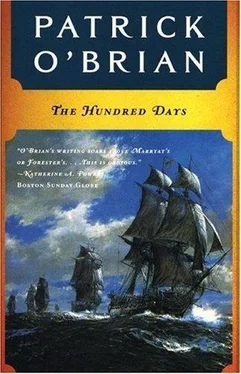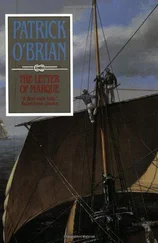Patrick O'Brian - The Hundred Days
Здесь есть возможность читать онлайн «Patrick O'Brian - The Hundred Days» весь текст электронной книги совершенно бесплатно (целиком полную версию без сокращений). В некоторых случаях можно слушать аудио, скачать через торрент в формате fb2 и присутствует краткое содержание. Жанр: Книги. Описание произведения, (предисловие) а так же отзывы посетителей доступны на портале библиотеки ЛибКат.
- Название:The Hundred Days
- Автор:
- Жанр:
- Год:неизвестен
- ISBN:нет данных
- Рейтинг книги:3.5 / 5. Голосов: 2
-
Избранное:Добавить в избранное
- Отзывы:
-
Ваша оценка:
- 80
- 1
- 2
- 3
- 4
- 5
The Hundred Days: краткое содержание, описание и аннотация
Предлагаем к чтению аннотацию, описание, краткое содержание или предисловие (зависит от того, что написал сам автор книги «The Hundred Days»). Если вы не нашли необходимую информацию о книге — напишите в комментариях, мы постараемся отыскать её.
The Hundred Days — читать онлайн бесплатно полную книгу (весь текст) целиком
Ниже представлен текст книги, разбитый по страницам. Система сохранения места последней прочитанной страницы, позволяет с удобством читать онлайн бесплатно книгу «The Hundred Days», без необходимости каждый раз заново искать на чём Вы остановились. Поставьте закладку, и сможете в любой момент перейти на страницу, на которой закончили чтение.
Интервал:
Закладка:
By this time it was dark and the steady horses made their way through fireworks, cheering crowds, bonfires with children leaping over them, and great numbers of muskets being fired into the air, the smoke alas still racing northward, perhaps even faster than before.
‘Lord,’ said Stephen, as he and Jacob, having changed into more everyday clothes, walked downstairs to dinner at the consulate, ‘such an overwhelming wealth of colour, light, noise and emotion I do not think I have ever known before: nor had I known that there were anything like so many people in all Africa Minor. Yet in spite of the dreadful underlying anxiety about Surprise and Ringle - the dreadfully swift passage of time - I do not find that the tumult has quite destroyed my appetite.’
‘Even if it had done so, I believe my news would deal with the situation. Sidi Hafiz, whom I have known these many, many years, told me that great masses of the Russian horse, foot and artillery were blocked by floods in Podolia: the vanguard is waiting for them, so that the dangerous proximity - the time when our Assassins, our Bonapartist Balkan Moslems, can strike at both, causing hopeless confusion, ill-will, delay, mistrust and the like - is postponed for at least a week. This came in a wholly reliable overland message from Turkey.’
‘Thank Heaven for that,’ cried Stephen. ‘I have been watching the calendar, seeing this wretched month advance so briskly ... and every change in that vile moon’s shape has wrenched my heart.’
‘You have indeed grown much thinner these last days.’
‘I shall eat like a lion tonight, however. A whole week gained! Thank you so very much for telling me, dear Amos. Perhaps they will give us mutton.’
Lady Clifford’s dinner did indeed include mutton: boiled mutton in the English manner, with caper sauce. It was well enough in its way for those used to such dishes (and after several other delights it was followed by a really stout, solid pudding, of which the same might be said), but it could not really compare with the tender lamb, roasted or grilled on skewers in Jacob’s obscure quarters near the Gate of Woe. Stephen ate there daily when he was not staring at the horizon or walking about Algiers with Jacob; but in the evening he returned to the consulate to dine with the Cliffords. It was on one of these days, these as it were free days which a kind fate had added to their calendar, that Jacob and he were passing through the now active, reanimated slavemarket when Jacob, catching sight of an acquaintance, begged Stephen to wait for him. By heredity Jacob was a jewel-merchant, and the profession, still slumbering in his bosom, was always ready to awake: he had retained not only an intimate knowledge of gem-stones but a fervent love for some of them, and he wished this acquaintance to exchange a small, exquisite jasper bowl for some few of the paper of moderate diamonds that he habitually carried, very well hidden, to provide for such a deal. ‘I shall not be long,’ he said. ‘Let us meet at the blue-domed coffee-house, there in the far corner.’
‘Certainly,’ said Stephen; and he was wandering slowly through this ultimate unhappiness and desolation, rendered just tolerable from being so customary, a fact of every day, like a cattle market, when he heard a voice lost in misery say, ‘Oh for the love of God,’ in Irish: not at all loud, with no strong emphasis. He turned and saw two small children, a boy and a girl, ugly, dirty, and thin. They were far too young for the usual chains, but they were tied together, left arm to right arm, by a piece of string.
The cheerful merchant called out to Stephen, first in Arabic, then in a mostly Spanish lingua franca, that he should have them for a trifle - they were perfectly healthy and in a very few years, if fed moderately, they would be capable of severe labour: even now, ha, ha, they could be put to scare crows, and they could always be used for pleasure.
‘I shall speak to them,’ said Stephen, and this he did. They were twins, said the boy, Kevin and Mona Fitzpatrick, from Ballydonegan, where their father worked for Mr MacCarthy: they had gone to Dursey Island with Cousin Rory in the boat for crabs: somehow with the great wind and the rain from the north the boat came adrift while Rory was with his sweetheart and they were swept out to sea. In the morning the corsairs, the Moors, took them aboard. They had been raiding along the coast but they had brought away only one man, Sean Kelly: and the gentleman there - nodding at the merchant - had sold him yesterday. Sean had told them that the people of Dungarvan and somewhere to the north had killed two dozen Moors.
A person with a somewhat bookish, secretarial look - a person whom Stephen might well have seen among the new Dey’s retinue - spoke privately to the merchant, who listened with obvious respect: and when he had gone Stephen said, in the usual indifferent horse-coper’s tone, ‘I should like to know what kind of a price such goods fetch in this city.’ The merchant replied, ‘Four guineas for the boy, sir - the usual redemption fee - and I will throw in the girl for the honour of your custom.’
‘Very well,’ said Stephen, feeling in his pocket. ‘But you must give me a receipt.’
The merchant bowed, wrote on a piece of paper, sealed it, received the coins, cut the piece of string, and formally passed the children over with the customary blessing and a second bow. Stephen returned the civility, told the children that he had bought them, and bade each take a hand. This they did without a word, and he led them across the market to the blue dome.
‘Amos,’ he said, ‘do you think that the people of this house would have something suitable for children? I have just bought these two.’
‘Have they teeth?’
‘Kevin and Mona, have you teeth?’
They nodded very gravely, and showed them: fine healthy teeth, with the gaps usual at their age.
‘Then I shall call for yoghurt, sugared, and soft bread. Pray what was the language in which you spoke to them?’
‘It was Irish, the language spoken by many if not by most of the people in Ireland.’
Jacob waved his hand, gave his order, and asked, ‘Do these children speak no English?’
‘I will ask them when there is a little food in their bellies. They might weep if they were questioned before.’
How it vanished, the yoghurt and the great soft flap of bread: within minutes the children looked far more nearly human. And on being asked, after a second helping, Mona said that although she did not know much, she could say most of a Hail Mary. Kevin only hung his head.
‘Do you think that kind woman by the Gate of Woe would wash these children, clothe them in modest decency, and even brush their hair?’
‘Fatima? I am sure of it. She might find them shoes, too.’
‘I doubt they have ever worn shoes.’ He asked them and they both shook their heads. ‘Not even for Mass?’ Renewed shaking, and a hint of tears. ‘I know what might answer very well,’ said Stephen. ‘Those shoes we call espardenyas, made of sailcloth with soft cord soles and ribbons to attach them. Are they to be had, do you think? I should not like to carry them to the consulate barefoot.’
‘Certainly they are to be had. At the southern corner of this very square they’re to be had.’
In these shoes (red for the one, blue for the other) they hobbled with ludicrous pride to Amos Jacob’s dubious lair: by the time they reached it they were walking quite easily and their starved little faces were more nearly human, even ready to smile. Fatima, a capable, intelligent woman, looked at them with more sorrow than disapproval: after a longish pause she brought them back washed, clothed, brushed, fed yet again and almost unrecognizable, but perfectly willing to be friendly.
Читать дальшеИнтервал:
Закладка:
Похожие книги на «The Hundred Days»
Представляем Вашему вниманию похожие книги на «The Hundred Days» списком для выбора. Мы отобрали схожую по названию и смыслу литературу в надежде предоставить читателям больше вариантов отыскать новые, интересные, ещё непрочитанные произведения.
Обсуждение, отзывы о книге «The Hundred Days» и просто собственные мнения читателей. Оставьте ваши комментарии, напишите, что Вы думаете о произведении, его смысле или главных героях. Укажите что конкретно понравилось, а что нет, и почему Вы так считаете.












